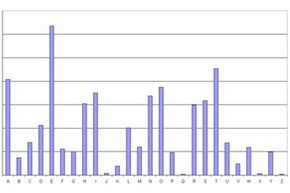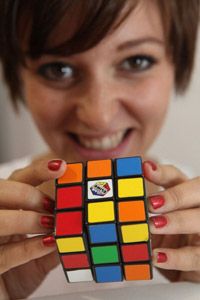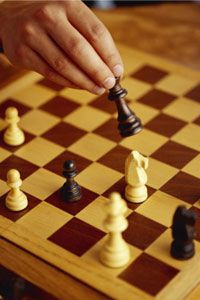If you open most major Sunday morning newspapers, you'll still find the classic crossword puzzle, but some papers are offering readers other challenging brain games like cryptoquotes, too. Cryptoquotes are word puzzles derived from cryptology, which is the science of secret writing. In today's technology-driven society, cryptology is mostly used to protect personal information like passwords or PINs, but cryptology's history is the stuff of spy movies.
Before modern computers made encryption more sophisticated, people had to rely on other ways of delivering classified information. Cryptograms, which are messages that have been encrypted by substituting a letter, number or other symbol for each letter in the original message, were used successfully to send top-secret information as far back as Julius Ceasar's time, as well as during the Revolutionary War and both World Wars. Cryptograms captured the public's interest and evolved from military technology into entertaining word puzzles. The puzzles have gone in and out of fashion over the centuries, but have continually enjoyed a small following among word puzzle fanatics (and middle school students who pass old-fashioned paper notes in class). However, when author Dan Brown's books "The Lost Symbol" and "The Da Vinci Code" became best sellers, the public's fascination with cryptogram puzzles was renewed, along with its many spin-offs -- including cryptoquotes.
Advertisement
Unlike cryptograms, which can include any message, cryptoquote word puzzles contain either a famous saying or a quote by a famous person. The quote must be translated using a cipher, or a key, in which one letter stands for another. Hundreds of ciphers have been created, but the ones most commonly used in cryptoquotes are known as classical ciphers. They might include simple substitutions -- for example, "How Stuff Works" might be encrypted as "Iad Twcbb Dahgt," where "B" substitutes for "F" and "T" substitutes for "S." Transposition ciphers, in which letters are transposed, are also common -- for example, "How Stuff Works" might be encrypted as "Wkros Fstuf Who."
These ciphers are generally easy to decode for anyone with a pen and a little time on their hands, but it does take a bit of practice and strategy to improve your speed. Read on to learn how to solve cryptoquotes and get some tips for improving your time.
Advertisement



